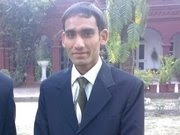
Maulana Abul Kalam Muhiyuddin Ahmed (11 November 1888 – 22 February 1958) was a Muslim scholar and a senior political leader of the Indian independence movement. He was one of the most prominent Muslim leaders to support Hindu-Muslim unity, opposing the partition of India on communal lines. Following India's independence, he became the first Minister of Education in the Indian government. He is commonly remembered as Maulana Azad; he had adopted Azad (Free) as his pen name.
Maulana Abul Kalam Azad was born in the year 1888 in Mecca. His forefather's came from Herat (a city in Afghanistan) in Babar's days. Azad was a descendent of a lineage of learned Muslim scholars, or maulanas. His father's name was Maulana Khairuddin and his mother was the daughter of Sheikh Mohammad Zaher Watri.
In 1890, Azad's father moved to Calcutta. Educated according to the traditional curriculum, Azad learned Arabic and Persian first and then philosophy, geometry, mathematics and algebra. He was taught at home, first by his father, later by appointed teachers who were eminent in their respective fields. Seeing that English was fast becoming the international language, Azad taught himself to read, write and speak the language. He adopted the pen name "Azad" to signify his freedom from traditional Muslim ways.
Maulana Abul Kalam Azad was born in the year 1888 in Mecca. His forefather's came from Herat (a city in Afghanistan) in Babar's days. Azad was a descendent of a lineage of learned Muslim scholars, or maulanas. His father's name was Maulana Khairuddin and his mother was the daughter of Sheikh Mohammad Zaher Watri.
In 1890, Azad's father moved to Calcutta. Educated according to the traditional curriculum, Azad learned Arabic and Persian first and then philosophy, geometry, mathematics and algebra. He was taught at home, first by his father, later by appointed teachers who were eminent in their respective fields. Seeing that English was fast becoming the international language, Azad taught himself to read, write and speak the language. He adopted the pen name "Azad" to signify his freedom from traditional Muslim ways.
Works by Abul Kalam Azad
(1931), Tarjuman al-Qur’an, vol.1, (1936), vol. 2, Daftar-e-Tarjuman al-Qur’an, Delhi. (n.d.), Shaikh Mubarak Ali, Lahore. (1945), 2nd edition, Karachi. Translated into English by Syed Abdul Latif, Kazi Publications, Lahore, (n.d.).
(1958), Basic Concepts of the Quran, Syed Abdul Latif, ed. Academy of Islamic Studies, Hyderabad.
(1959), India Wins Freedom – An Autobiographical Narrative, Humayun Kabir, ed., Orient Longman, Bombay.
(1967), Ghubar-e-Khatir, Malik Ram, ed. Sahitya Akademi, New Delhi and (n.d.), Anarkali Kitab Ghar, Lahore.
(1931), Tarjuman al-Qur’an, vol.1, (1936), vol. 2, Daftar-e-Tarjuman al-Qur’an, Delhi. (n.d.), Shaikh Mubarak Ali, Lahore. (1945), 2nd edition, Karachi. Translated into English by Syed Abdul Latif, Kazi Publications, Lahore, (n.d.).
(1958), Basic Concepts of the Quran, Syed Abdul Latif, ed. Academy of Islamic Studies, Hyderabad.
(1959), India Wins Freedom – An Autobiographical Narrative, Humayun Kabir, ed., Orient Longman, Bombay.
(1967), Ghubar-e-Khatir, Malik Ram, ed. Sahitya Akademi, New Delhi and (n.d.), Anarkali Kitab Ghar, Lahore.

